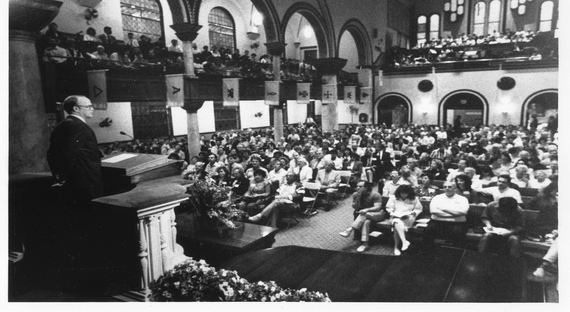
One of the hallmarks of Presbyterian and Reformed churches (including Reformed Baptist congregations) is our approach to corporate public worship. While we affirm the importance of private and family worship, the emphasis has usually fallen on public worship. Public worship is not optional and what we do in worship is not left up to us to figure out. God has set out in his Word not only that he wants to be worshiped and that it is only he who is to be worshiped. He has also revealed to us how he wants us to worship him (Exodus 20:3-6). This concern with how we worship God has come to be called the Regulative Principle of Worship (RPW).
The RPW teaches us that we can only do in public worship what the Scriptures teach by command, example, or what can be ascertained by good and necessary consequence. Light can be shed on the RPW in contrast with what is called the “normative principle.” The normative principle teaches that we can do in worship whatever is not forbidden. These are the two basic approaches to Christian public worship. Presbyterian and Reformed churches believe the RPW is the biblical standard.
When we consider the details of the RPW we talk about elements, forms, and circumstances (others include further refinements). The elements are the things we do: prayer, singing, the reading of Scripture, preaching, the sacraments, and the giving of offerings. These are dictated by Scripture. We cannot add to or subtract from them. The circumstances involve whether we stand or sit, what time of the day we meet for worship, and whether we use electronic amplification. Forms are such things as praying the Lord’s Prayer. While the elements of worship are specified, circumstances and forms vary from place to place and time to time.
Traditionally the RPW is associated with what is called exclusive psalm singing. Historically the standard practice of Presbyterian churches was to sing only psalms in corporate worship. Over time that has changed so that many Presbyterian and Reformed churches sing no psalms at all. I am not persuaded by the arguments put forward for exclusive psalmody. However, we would do well to sing psalms as part of the repertory of songs we sing in worship. My view is usually called “inclusive psalmody.” Those committed to exclusive psalm singing usually also use no instruments. There are theological arguments for this practice as well. Again, I am not convinced of their necessity.
Many churches that honor the RPW may not limit themselves to exclusive psalm singing but they will often stick with traditional hymns and hymn tunes and with the piano and organ. However, I do not believe the RPW necessitates such a practice. There may be practical or pastoral reasons for sticking with traditional hymns, tunes, and instruments. The RPW (and therefore the Bible itself) does, I believe, offer us some basic principles for what songs are to be sung in worship.
Whether the psalms and hymns are thousands of years old, or written in the last century, the question of the quality of the words and music is important. Are the words Scriptural and theologically sound? Hymnody has been an effective means of teaching theology in ages past. Is the music suitable to the words? If you are confessing sin, the music ought not to be bouncy and happy. Some of this is culturally relative but as a rule, confession of sin is a somber, holy event. On the other hand, singing a joyful anthem of praise to God for his wondrous works of creation, providence, and redemption should not sound or feel like a funeral dirge. A song of thankfulness for salvation perhaps should be happy and bouncy.
What instruments we use in worship will depend on the congregation with which we are worshiping. The piano and organ are perfectly suitable. But so too are acoustic and electric guitars and drums. It may be that a congregation prefers wood instruments, another electronic. It would be hard to argue from Scripture for the necessity of one kind over another. The introduction and use of psalms, hymns, and instruments is a matter of pastoral wisdom and sensitivity and are not things that ought to split a congregation any more than a dispute over the color of the carpet or hymnal (or psalter).
Finally, the RPW does not settle the question about whether it is better to sing from a book or off an overhead screen. There are good arguments for both. You are neither holier because you sing from a hymnal nor if you sing off the wall. We need to be careful not confuse custom or tradition with a biblical mandate. What we sing and how we are accompanied need to be God-honoring just as much as what is preached and prayed.
Jeffrey C. Waddington (Ph.D., Westminster Theological Seminary) is stated supply at Knox Orthodox Presbyterian Church. He also serves as a panelist at Christ the Center and East of Eden and is the secretary of the board of the Reformed Forum. Additionally he serves as an articles editor for the Confessional Presbyterian Journal.

The Alliance of Confessing Evangelicals is member supported and operates only by your faithful support. Thank you.















 © Alliance of Confessing Evangelicals
© Alliance of Confessing Evangelicals


